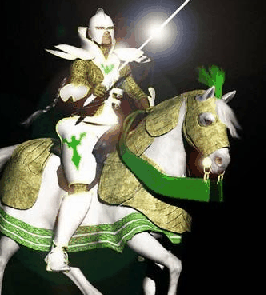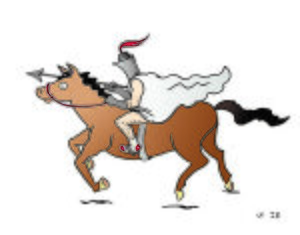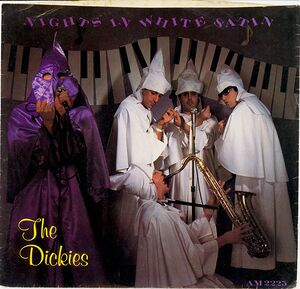Knights in White Satin
The Knights in White Satin were an order of warrior monks who first organized in the 11th Century to protest the rough undergarments of the time. Shunning the coarse wool habits and hair shirts of other monastic orders, the Knights went on pilgrimages and Holy Crusades, never reaching the end. They traveled bedecked in white satin, green silks, and Chantilly lace but then this comfort-seeking order fell on hard times. Enemies such as the Knights Templar and the Saracens realized their swords and spears would easily pierce the effeminate robes of the Knights in White Satin so by the end of the 13th Century they were all but extinct. Only later were the Knights to return, with a renewed and more sinister existence in the United States in the early years of the 20th Century before once again vanishing from history.
Founding the Order: Eternal Life through Lingerie
The Knights in White Satin were founded in London, England by a dainty, foppish mendicant by the name of Friar Eustace (born circa 1013 AD). Having been turned away from the Benedictines and Franciscans due to his tendency to wear satin negligees under his robes, Friar Eustace sought an order of people who would understand what he was going through, and would know just what the truth was. At the age of 23, he proclaimed that Christ had come to him in a dream and told him of beauty he'd always missed, with his eyes before. Friar Eustace awoke from his dream and gathered a small army of unemployed beefcake soldiers to join his new brotherhood. He promised them opulence and luxury, assuring them that they would always eat sweetmeats and parade in white satin undershorts. They quickly went to work and constructed a monastery on an abandoned lot near the London First Millennium Tower. There, they trained for battle in soft silks while reading Bibles and chanting prayers.
The Height of the Order: Victoria's Secret
Lured into a lifestyle of silk panty-wearing, the ranks of the Knights in White Satin soon grew to number in the thousands. Chapters were opened in France, Lichtenstein, Spain, Romania, and the Castro District in San Francisco, California.
From approximately 1050 AD to 1170 AD, the Knights in White Satin were the preeminent warrior monks in the world of medieval fashion and comfort. Every royal joust and tournament was opened by an impeccably dressed Knight in White Satin, who would also emcee the proceedings. Queens wanted to sleep with the Knights in White Satin, and Kings wanted to be the Knights in White Satin. Rival chivalric orders just wanted to kick the shit out of them.
A cult following soon emerged that circled around "Victoria's Secret," the holy relic that marked and distinguished the Order of the Knights in White Satin from all other warrior monks. No contemporary drawings of Victoria's Secret survive, but it is believed by scholars that the relic consisted of a pair of white silk crotchless panties worn by St.Victoria at the scene of her martyrdom on a Milan catwalk.
The Fall of the Order: Pride and Betrayal
Many historians believe that the Knights in White Satin became too successful for their own good. When Marco Polo opened the "Satan Road" to Asia, the Knights quickly established a trade monopoly over the route and were known to be hoarding upwards of 90% of the satin that was being imported to Europe in the 1100's. Jealousies flared just at the time when the egos of the Knights in White Satin reached their zenith. Believing themselves to be invincible, the Knights undertook to join in the crusades to the Holy Land wearing only their satin "armor." They quickly learned they were quite mortal beings as Saracen arrows pierced their breasts and the back-stabbing swords of the Teutonic Knights swords severed their shoulders. As over 95% of the Knights in White Satin met their deaths on crusades between 1145 AD and 1170 AD, recruitment soon became a problem.
Those who stayed behind fared little better. The last medieval Knight in White Satin, Sir Justin the Moody, was found lying dead in the opulent luxury of his king-sized bed in sheets of white satin, 10,000 threat-count. In his hand were letters Justin had written, never meaning to send. "Just what the truth is, I can't say anymore," they warned. In the world of betrayal that the Knights had found themselves in the ultimate years, these words were prophetic.
The Renewal of the Order by the Ku Klux Klan
In the early years of the 20th Century, a racist group of sheet-wearing American Southerners were looking for a way to jazz up their image and recruit new members. Lofty titles like "Grand Cyclops" and "Imperial Wizard" just weren't enough anymore, and in any event, few members of the Klan could hope to be elevated to such high positions in the order. The solution, however, was found when Klan historians read about a defunct order of warrior monks known as the "Knights in White Satin."
Looking to upgrade their image from that of a bunch of hick sheet-wearers into something more upscale, Klan leaders leaped at the chance to link themselves with the Knights in White Satin. By proclaiming all members to be Knights, and by issuing white satin sheets and hoods to all members, Klan leaders were able to upgrade the image and self-esteem of all members overnight.
Then, the Federal Bureau of Investigation launched a crackdown on Klan membership due to the Klan's crimes against humanity like "lynching" and "murdering." Almost as quickly as the revival of the Knights in White Satin had started, it was over.
See Also
| |||||||||||||
| Featured version: 10 November 2011 | |
| This article has been featured on the main page. — You can vote for or nominate your favourite articles at Uncyclopedia:VFH. | |





